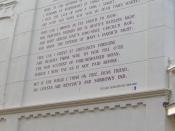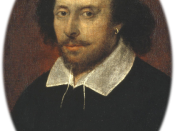When there are women and an omnipotent force to procreate there will be a number of resources that a man will use in order to attract the opposite sex. Often with the use of the notorious whistle/mating call, the perpetual use of lies about income, the stench of musk cologne, or the ever-popular use of the love poem, men strive to appeal to women with the intent to see his way to her heart. William Shakespeare, a man who, based on his works, was full of passion for the opposite sex - whether it had been honest love or perverse lust. Nonetheless, Shakespeare, like most men, wished to charm women. With this having been so, Shakespeare's weapon of choice to be inwrought to a woman's heart was the powerful love poem. He understood love and how to attain love and demonstrated this in his often praised sonnets. Writing about the joys and tragedies while also writing about the trials and tribulations of love was Shakespeare's objective in select sonnets - Sonnet 116 and Sonnet 129.
His views on what is love put into prose enables all that read his sonnets to interpret Shakespeare's definitions of love and lust.
Throughout his sonnets, Shakespeare discusses the conflicts that men have with time, such as time vs. the body and time vs. the mind. Although time withers the body and eventually the mind, Shakespeare writes that time has no effect, however, on love. Love prevails throughout time and is forever young when it is shared by two hearts that have become one. Love is a substance of the hearts united and calls for two individuals to commit to each other - commitment being marriage. Having committed one's self through marriage both individuals now turn a blind eye to the other's faults. To...


